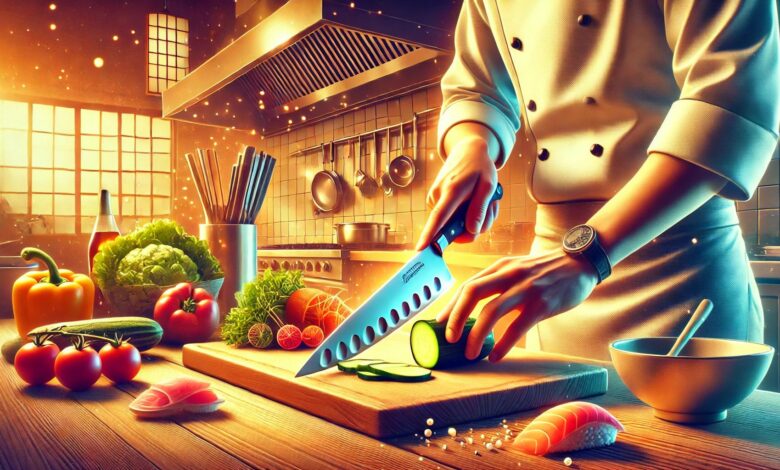Why Japanese knives Are Used By Chefs In the kitchen

They are something beyond instruments; They are a representation of high quality, careful design, and centuries of tradition. But why do so many chefs prefer Japanese knives to Western ones? They are essential for cooking because of their sharpness, adaptability, long-term use, and skill.
Let’s find out why chefs use knife store in the kitchen and how they make cooking easier and produce better food. An excellent illustration of a knife with balance and versatility is the Gyuto, which is a Japanese chef’s knife. The Gyuto is used by chefs to cut meat and vegetables, among other things. Its balanced, lightweight design makes it easy to use even during a busy day in the kitchen, reducing wrist and arm strain.
Precision and Sharpness
Sharpness is one of the primary reasons chefs prefer Japanese knives. A sharper blade not only makes cutting easier but also makes each slice more precise. When it comes to delicate tasks like filleting fish or making paper-thin vegetable slices, precision is crucial in a professional kitchen.
The Yanagiba, a long, single-beveled japanese chef knife used to slice sashimi, can be used by chefs to make clean, precise cuts that don’t change the delicate texture of raw fish. Ingredients are protected from being ripped and bruised by the sharper edge, preserving their original flavors and appearance. Slicing through ingredients with a well-maintained Japanese knife can appear effortless when preparing food.
Lightweight and Balanced Design
Japanese knives are also favored by chefs due to their superior balance and lightweight construction. Western knives are typically heavier and have thicker blades made for stronger cutting. Japanese knives, on the other hand, are typically thinner and lighter, making them less tiring to use for extended periods of time.
Another important aspect of a Japanese knife is its balance. Chefs need more control when performing intricate tasks, so the weight distribution between the blade and the handle has been carefully designed to give them more of it. Chefs can maneuver with precision and avoid accidents like slipping or cutting too deeply with a well-balanced knife.
Specialized Knife Designs for Different Tasks
Japanese knives are more specialized than Western knives, which are frequently made for general use. Japanese knives are designed specifically for use in the kitchen. Chefs, whose jobs require precision and speed in all areas, are drawn to this area of expertise.
Durability and Longevity
The majority of Japanese knives are made of high-quality steel, so they last longer than many Western knives. The knives need less sharpening because the steel is hard enough. Instead, they remain more sharp longer. In a professional kitchen, where knives are used frequently and downtime for sharpening can impede workflow, this durability is especially important.
Japanese knives also last longer because they are made of hard steel. A high-quality Japanese knife can last for decades with proper care, making it an investment worth making for chefs who rely on their tools every day. However, it is essential to keep in mind that Japanese knives are made of stronger steel, which makes them more brittle and necessitates careful handling to prevent damage or chipping. Japanese chefs know how important it is to care for their knives, like sharpening them with a whetstone and hand-washing them to keep their quality.
Culinary Tradition and Respect
For many chefs, using Japanese knives is not just about performance; it’s also about respect for culinary traditions. The artistry and heritage associated with Japanese knife-making resonate with chefs who appreciate the importance of their tools. Using a Japanese knife is often seen as a way to honor the craft of cooking and the traditions that come with it. This connection enhances the chef’s experience in the kitchen, making each cut a mindful and respectful act.





